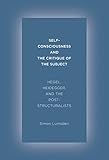Self-Consciousness and the Critique of the Subject : Hegel, Heidegger, and the Poststructuralists / Simon Lumsden.
Material type: TextPublisher: New York, NY : Columbia University Press, [2014]Copyright date: ©2014Description: 1 online resource (288 p.)Content type:
TextPublisher: New York, NY : Columbia University Press, [2014]Copyright date: ©2014Description: 1 online resource (288 p.)Content type: - 9780231168229
- 9780231538206
- 126.09 23
- BD450 .L795 2014
- BD450 .L795 2015
- online - DeGruyter
- Issued also in print.
| Item type | Current library | Call number | URL | Status | Notes | Barcode | |
|---|---|---|---|---|---|---|---|
 eBook
eBook
|
Biblioteca "Angelicum" Pont. Univ. S.Tommaso d'Aquino Nuvola online | online - DeGruyter (Browse shelf(Opens below)) | Online access | Not for loan (Accesso limitato) | Accesso per gli utenti autorizzati / Access for authorized users | (dgr)9780231538206 |
Frontmatter -- Contents -- Acknowledgments -- Abbreviations -- Introduction -- 1. The Metaphysics of Presence and the Worldless Subject -- 2. Fichte's Striving Subject -- 3. Hegel -- 4. Heidegger, Care, and Selfhood -- 5. Derrida and the Question of Subjectivity -- 6. The Dialectic and Transcendental Empiricism -- Conclusion -- Notes -- Bibliography -- Index
restricted access online access with authorization star
http://purl.org/coar/access_right/c_16ec
Poststructuralists hold Hegel responsible for giving rise to many of modern philosophy's problematic concepts-the authority of reason, self-consciousness, the knowing subject. Yet, according to Simon Lumsden, this animosity is rooted in a fundamental misunderstanding of Hegel's thought, and resolving this tension can not only heal the rift between poststructuralism and German idealism but also point these traditions in exciting new directions. Revisiting the philosopher's key texts, Lumsden calls attention to Hegel's reformulation of liberal and Cartesian conceptions of subjectivity, identifying a critical though unrecognized continuity between poststructuralism and German idealism. Poststructuralism forged its identity in opposition to idealist subjectivity; however, Lumsden argues this model is not found in Hegel's texts but in an uncritical acceptance of Heidegger's characterization of Hegel and Fichte as "metaphysicians of subjectivity." Recasting Hegel as both post-Kantian and postmetaphysical, Lumsden sheds new light on this complex philosopher while revealing the surprising affinities between two supposedly antithetical modes of thought.
Issued also in print.
Mode of access: Internet via World Wide Web.
In English.
Description based on online resource; title from PDF title page (publisher's Web site, viewed 02. Mrz 2022)


